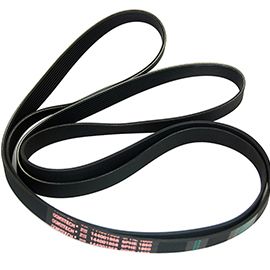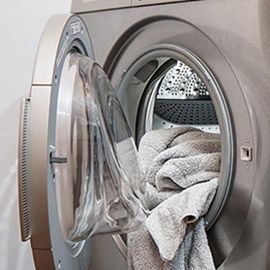Your dryer tangle the laundry

Dryers are machines designed to simplify our lives by making it easier to do the laundry. All we have to do is throw the laundry into the drum and choose the right setting. When the machine is working properly and is used correctly, it gives you dry laundry that's barely wrinkled and can be ironed and put away in no time at all. Your dryer has a heating drum that uses alternating rotation to dry everything homogeneously while avoiding knots. If it seems like your dryer is tangling your laundry, take a moment to check for malfunctions and verify that you're using the machine properly.
LES CAUSES POUR CETTE PANNE :
-
THE DRUM ISN'T SPINNING CORRECTLY
-
STATIC ELECTRICITY
-
THE DRYER BELT IS DEFECTIVE
-
THE DRYER IS TOO FULL
-
LAUNDRY ISN'T LOADED INTO THE DRUM CORRECTLY
WARNING
For security reasons, we advise unplugging the dryer from its power source before examining.
There is a risk of electric shock.
THE DRUM ISN'T SPINNING CORRECTLY
 The drum is the main part of your dryer. It is in direct contact with your clothing, sheets and other laundry items throughout the drying cycle. Normally, the drum starts spinning as soon as the machine begins its cycle. Its speed varies, depending on the chosen settings. The rotary movement provides constant ventilation of the laundry, and keeps the various textiles from rubbing against each other repeatedly. This lowers the risk of your laundry being damaged while drying. One problem with the drum's rotation can ruin these positive results: the laundry goes topsy-turvy and becomes tangled. To make sure the drum of your dryer is spinning normally, observe it during a drying cycle. Remember that the spin time in each direction may vary from 5 to 20 minutes, depending on the model. You can also perform a manual check for any foreign objects that may be blocking the rotation. Make sure your machine is turned off before examining.
The drum is the main part of your dryer. It is in direct contact with your clothing, sheets and other laundry items throughout the drying cycle. Normally, the drum starts spinning as soon as the machine begins its cycle. Its speed varies, depending on the chosen settings. The rotary movement provides constant ventilation of the laundry, and keeps the various textiles from rubbing against each other repeatedly. This lowers the risk of your laundry being damaged while drying. One problem with the drum's rotation can ruin these positive results: the laundry goes topsy-turvy and becomes tangled. To make sure the drum of your dryer is spinning normally, observe it during a drying cycle. Remember that the spin time in each direction may vary from 5 to 20 minutes, depending on the model. You can also perform a manual check for any foreign objects that may be blocking the rotation. Make sure your machine is turned off before examining.
STATIC ELECTRICITY
 The build up of static electricity is a common natural occurrence. Different kinds of textiles rubbing together and the presence of hot air create the ideal conditions for this phenomenon. Certain fibers, particularly synthetics, are more likely to build up a static charge in the dryer. The result: your clothing sticks together and ends up tangled.
The build up of static electricity is a common natural occurrence. Different kinds of textiles rubbing together and the presence of hot air create the ideal conditions for this phenomenon. Certain fibers, particularly synthetics, are more likely to build up a static charge in the dryer. The result: your clothing sticks together and ends up tangled.
There's an easy way to avoid static electricity build-up in your dryer. Just toss a ball of aluminum foil into the drum. One of the properties of aluminum is attracting and absorbing static electricity.
THE DRYER BELT IS DEFECTIVE
 The dryer belt is an essential part of your dryer. It is basically a large elastic rubber strap, around one or two centimeters wide, that goes around the drum. It's what makes the drum spin and move. A defective belt can keep the drum from functioning properly. If the belt becomes too loose or is broken, the laundry won't be spun and won't dry anymore. If that happens, you'll need to change it.
The dryer belt is an essential part of your dryer. It is basically a large elastic rubber strap, around one or two centimeters wide, that goes around the drum. It's what makes the drum spin and move. A defective belt can keep the drum from functioning properly. If the belt becomes too loose or is broken, the laundry won't be spun and won't dry anymore. If that happens, you'll need to change it.
Be sure to verify the model number of your dryer belt before replacing it. The diameter and length can vary between models.
THE DRYER IS TOO FULL
 When the dryer is very full or overfilled, it's more difficult for the drum to turn, and the laundry becomes knotted and tangled. Respect the maximum load size specified by the manufacturer. An overloaded machine is more likely to damage clothing and leave it wrinkled. It also uses more energy.As a general rule, avoid piling in too much laundry.
When the dryer is very full or overfilled, it's more difficult for the drum to turn, and the laundry becomes knotted and tangled. Respect the maximum load size specified by the manufacturer. An overloaded machine is more likely to damage clothing and leave it wrinkled. It also uses more energy.As a general rule, avoid piling in too much laundry.
An over-filled dryer uses more energy. To speed drying time, it's also important to make sure the laundry is spun enough.
LAUNDRY ISN'T LOADED INTO THE DRUM CORRECTLY
 Arrange your laundry evenly in the drum to help keep the laundry from tangling. Each item should be loaded separately. As much as possible, avoid drying too many different types of laundry together. Underwear and T-shirts, for example, can work their way inside a duvet cover, forming a wet or poorly-dried wad of clothing. You can also try using mesh laundry bags to keep different types of clothing separated.
Arrange your laundry evenly in the drum to help keep the laundry from tangling. Each item should be loaded separately. As much as possible, avoid drying too many different types of laundry together. Underwear and T-shirts, for example, can work their way inside a duvet cover, forming a wet or poorly-dried wad of clothing. You can also try using mesh laundry bags to keep different types of clothing separated.
